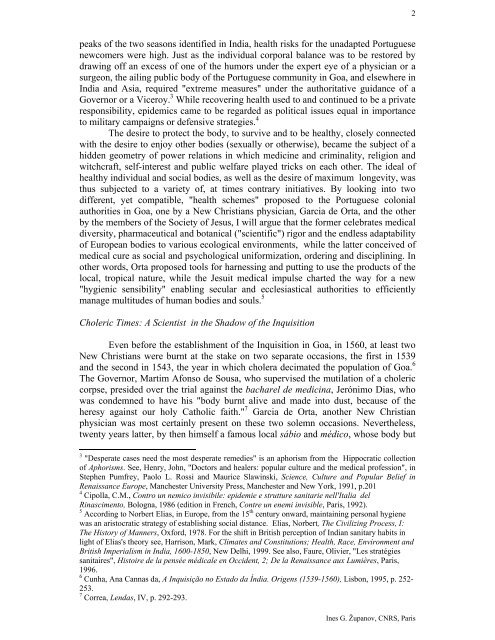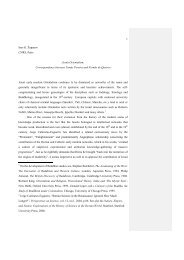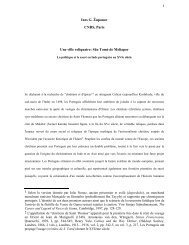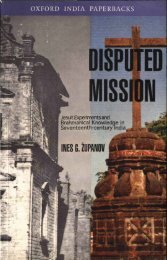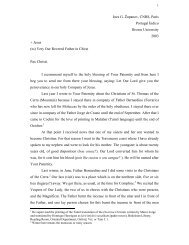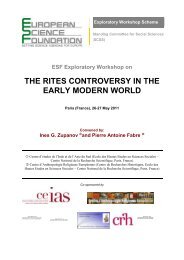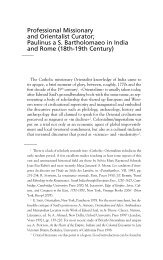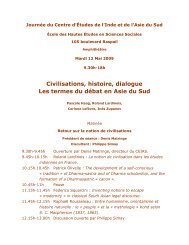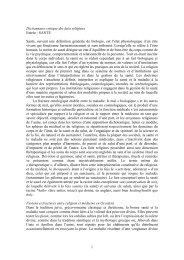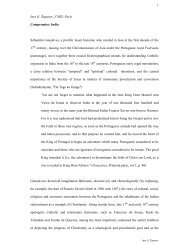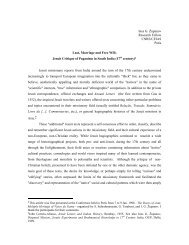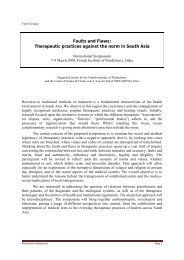Drugs, Health, Bodies and Souls in the Tropics ... - Ines G. Županov
Drugs, Health, Bodies and Souls in the Tropics ... - Ines G. Županov
Drugs, Health, Bodies and Souls in the Tropics ... - Ines G. Županov
You also want an ePaper? Increase the reach of your titles
YUMPU automatically turns print PDFs into web optimized ePapers that Google loves.
2<br />
peaks of <strong>the</strong> two seasons identified <strong>in</strong> India, health risks for <strong>the</strong> unadapted Portuguese<br />
newcomers were high. Just as <strong>the</strong> <strong>in</strong>dividual corporal balance was to be restored by<br />
draw<strong>in</strong>g off an excess of one of <strong>the</strong> humors under <strong>the</strong> expert eye of a physician or a<br />
surgeon, <strong>the</strong> ail<strong>in</strong>g public body of <strong>the</strong> Portuguese community <strong>in</strong> Goa, <strong>and</strong> elsewhere <strong>in</strong><br />
India <strong>and</strong> Asia, required "extreme measures" under <strong>the</strong> authoritative guidance of a<br />
Governor or a Viceroy. 3 While recover<strong>in</strong>g health used to <strong>and</strong> cont<strong>in</strong>ued to be a private<br />
responsibility, epidemics came to be regarded as political issues equal <strong>in</strong> importance<br />
to military campaigns or defensive strategies. 4<br />
The desire to protect <strong>the</strong> body, to survive <strong>and</strong> to be healthy, closely connected<br />
with <strong>the</strong> desire to enjoy o<strong>the</strong>r bodies (sexually or o<strong>the</strong>rwise), became <strong>the</strong> subject of a<br />
hidden geometry of power relations <strong>in</strong> which medic<strong>in</strong>e <strong>and</strong> crim<strong>in</strong>ality, religion <strong>and</strong><br />
witchcraft, self-<strong>in</strong>terest <strong>and</strong> public welfare played tricks on each o<strong>the</strong>r. The ideal of<br />
healthy <strong>in</strong>dividual <strong>and</strong> social bodies, as well as <strong>the</strong> desire of maximum longevity, was<br />
thus subjected to a variety of, at times contrary <strong>in</strong>itiatives. By look<strong>in</strong>g <strong>in</strong>to two<br />
different, yet compatible, "health schemes" proposed to <strong>the</strong> Portuguese colonial<br />
authorities <strong>in</strong> Goa, one by a New Christians physician, Garcia de Orta, <strong>and</strong> <strong>the</strong> o<strong>the</strong>r<br />
by <strong>the</strong> members of <strong>the</strong> Society of Jesus, I will argue that <strong>the</strong> former celebrates medical<br />
diversity, pharmaceutical <strong>and</strong> botanical ("scientific") rigor <strong>and</strong> <strong>the</strong> endless adaptability<br />
of European bodies to various ecological environments, while <strong>the</strong> latter conceived of<br />
medical cure as social <strong>and</strong> psychological uniformization, order<strong>in</strong>g <strong>and</strong> discipl<strong>in</strong><strong>in</strong>g. In<br />
o<strong>the</strong>r words, Orta proposed tools for harness<strong>in</strong>g <strong>and</strong> putt<strong>in</strong>g to use <strong>the</strong> products of <strong>the</strong><br />
local, tropical nature, while <strong>the</strong> Jesuit medical impulse charted <strong>the</strong> way for a new<br />
"hygienic sensibility" enabl<strong>in</strong>g secular <strong>and</strong> ecclesiastical authorities to efficiently<br />
manage multitudes of human bodies <strong>and</strong> souls. 5<br />
Choleric Times: A Scientist <strong>in</strong> <strong>the</strong> Shadow of <strong>the</strong> Inquisition<br />
Even before <strong>the</strong> establishment of <strong>the</strong> Inquisition <strong>in</strong> Goa, <strong>in</strong> 1560, at least two<br />
New Christians were burnt at <strong>the</strong> stake on two separate occasions, <strong>the</strong> first <strong>in</strong> 1539<br />
<strong>and</strong> <strong>the</strong> second <strong>in</strong> 1543, <strong>the</strong> year <strong>in</strong> which cholera decimated <strong>the</strong> population of Goa. 6<br />
The Governor, Martim Afonso de Sousa, who supervised <strong>the</strong> mutilation of a choleric<br />
corpse, presided over <strong>the</strong> trial aga<strong>in</strong>st <strong>the</strong> bacharel de medic<strong>in</strong>a, Jerónimo Dias, who<br />
was condemned to have his "body burnt alive <strong>and</strong> made <strong>in</strong>to dust, because of <strong>the</strong><br />
heresy aga<strong>in</strong>st our holy Catholic faith." 7 Garcia de Orta, ano<strong>the</strong>r New Christian<br />
physician was most certa<strong>in</strong>ly present on <strong>the</strong>se two solemn occasions. Never<strong>the</strong>less,<br />
twenty years latter, by <strong>the</strong>n himself a famous local sábio <strong>and</strong> médico, whose body but<br />
3 "Desperate cases need <strong>the</strong> most desperate remedies" is an aphorism from <strong>the</strong> Hippocratic collection<br />
of Aphorisms. See, Henry, John, "Doctors <strong>and</strong> healers: popular culture <strong>and</strong> <strong>the</strong> medical profession", <strong>in</strong><br />
Stephen Pumfrey, Paolo L. Rossi <strong>and</strong> Maurice Slaw<strong>in</strong>ski, Science, Culture <strong>and</strong> Popular Belief <strong>in</strong><br />
Renaissance Europe, Manchester University Press, Manchester <strong>and</strong> New York, 1991, p.201<br />
4 Cipolla, C.M., Contro un nemico <strong>in</strong>visibile: epidemie e strutture sanitarie nell'Italia del<br />
R<strong>in</strong>ascimento, Bologna, 1986 (edition <strong>in</strong> French, Contre un enemi <strong>in</strong>visible, Paris, 1992).<br />
5 Accord<strong>in</strong>g to Norbert Elias, <strong>in</strong> Europe, from <strong>the</strong> 15 th century onward, ma<strong>in</strong>ta<strong>in</strong><strong>in</strong>g personal hygiene<br />
was an aristocratic strategy of establish<strong>in</strong>g social distance. Elias, Norbert, The Civiliz<strong>in</strong>g Process, I:<br />
The History of Manners, Oxford, 1978. For <strong>the</strong> shift <strong>in</strong> British perception of Indian sanitary habits <strong>in</strong><br />
light of Elias's <strong>the</strong>ory see, Harrison, Mark, Climates <strong>and</strong> Constitutions; <strong>Health</strong>, Race, Environment <strong>and</strong><br />
British Imperialism <strong>in</strong> India, 1600-1850, New Delhi, 1999. See also, Faure, Olivier, "Les stratégies<br />
sanitaires", Histoire de la pensée médicale en Occident, 2; De la Renaissance aux Lumières, Paris,<br />
1996.<br />
6 Cunha, Ana Cannas da, A Inquisição no Estado da Índia. Origens (1539-1560), Lisbon, 1995, p. 252-<br />
253.<br />
7 Correa, Lendas, IV, p. 292-293.<br />
<strong>Ines</strong> G. <strong>Županov</strong>, CNRS, Paris


